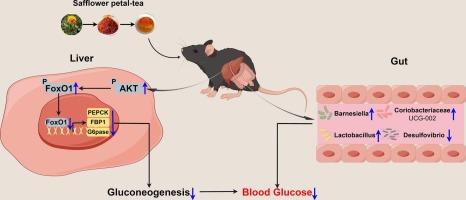Safflower petal water-extract consumption reduces blood glucose via modulating hepatic gluconeogenesis and gut microbiota
IF 3.8
2区 农林科学
Q2 FOOD SCIENCE & TECHNOLOGY
引用次数: 0
Abstract
Safflower is a widely utilized food and medicinal herb. The safflower petal is often used for tea-making or food colorant since the water-extract contains a lot of biologically active ingredients. This study aimed to evaluate the impacts of safflower petal water-extract (SE) on blood glucose regulation. The results demonstrated that both long-term and acute consumption of SE ameliorated the blood glucose regulation successfully. Mechanistically, SE suppressed the hepatic gluconeogenesis, which was involved with the protein kinase B (AKT)/forkhead transcription factor 1 (FoxO1) signaling pathway. In addition, SE modulated the gut microbiota that is related to host glucose regulation. Finally, drinking safflower petal-tea could efficiently decrease the healthy participants' blood glucose at two hours after breakfast. Hence, this study proved that drinking safflower petal-tea can be a feasible way to maintain stable blood glucose, and SE can be used as a potential function food ingredient for the prevention and amelioration of hyperglycemia.

红花花瓣水提取物的消耗通过调节肝脏糖异生和肠道微生物群来降低血糖
红花是一种用途广泛的食品和草药。红花花瓣通常被用于制茶或食用色素,因为水提取物含有大量的生物活性成分。本研究旨在探讨红花花瓣水提取物(SE)对血糖的调节作用。结果表明,长期和急性服用SE均能成功改善血糖调节。从机制上讲,SE抑制肝脏糖异生,这与蛋白激酶B (AKT)/叉头转录因子1 (FoxO1)信号通路有关。此外,SE还调节了与宿主葡萄糖调节相关的肠道微生物群。最后,饮用红花花瓣茶可以有效降低健康参与者早餐后2小时的血糖。因此,本研究证明饮用红花花瓣茶是一种可行的维持血糖稳定的方法,SE可以作为一种潜在的功能食品成分用于预防和改善高血糖。
本文章由计算机程序翻译,如有差异,请以英文原文为准。
求助全文
约1分钟内获得全文
求助全文
来源期刊

Journal of Functional Foods
FOOD SCIENCE & TECHNOLOGY-
CiteScore
9.60
自引率
1.80%
发文量
428
审稿时长
76 days
期刊介绍:
Journal of Functional Foods continues with the same aims and scope, editorial team, submission system and rigorous peer review. We give authors the possibility to publish their top-quality papers in a well-established leading journal in the food and nutrition fields. The Journal will keep its rigorous criteria to screen high impact research addressing relevant scientific topics and performed by sound methodologies.
The Journal of Functional Foods aims to bring together the results of fundamental and applied research into healthy foods and biologically active food ingredients.
The Journal is centered in the specific area at the boundaries among food technology, nutrition and health welcoming papers having a good interdisciplinary approach. The Journal will cover the fields of plant bioactives; dietary fibre, probiotics; functional lipids; bioactive peptides; vitamins, minerals and botanicals and other dietary supplements. Nutritional and technological aspects related to the development of functional foods and beverages are of core interest to the journal. Experimental works dealing with food digestion, bioavailability of food bioactives and on the mechanisms by which foods and their components are able to modulate physiological parameters connected with disease prevention are of particular interest as well as those dealing with personalized nutrition and nutritional needs in pathological subjects.
 求助内容:
求助内容: 应助结果提醒方式:
应助结果提醒方式:


